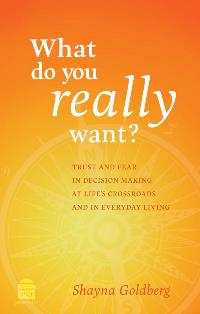Book | What Do You Really Want?

Managing decisions can be a significant source of stress, worry, and regret. In What Do You Really Want? Shayna Goldberg argues that deep self-awareness and an attitude of trust are the best tools for making strong decisions that we can feel confident about. If we learn how to recognize our fears, explore them, evaluate their potential consequences, and contemplate what we want moving forward, we will have an easier time owning and taking responsibility for our decisions.
Whether you are standing on the brink of a major decision, reflecting on those you have already made, or holding someone else’s hand as they face a daunting choice – this book will help illuminate the path toward better understanding, deeper self-awareness, and stronger decisions
Using true-to-life, relatable, and relevant scenarios drawn from real life questions posed to her by students, friends, and family, Goldberg uses Jewish sources and teachings in order to develop the philosophical underpinnings of these concepts. Furthermore, What Do You Really Want? lays out an invigorating vision for trust-based education that will captivate parents, teachers, community leaders, and everyone else besides.
We are thrilled to be able to offer you this discount code, WhatYHE . To order...
In a recent interview, Rabbanit Shayna shared these thoughts:
Q: You mention HaRav Aharon Lichtenstein zt"l several times in this book. What was your connection to him and how did he influence you?
A: Even before I really understood who Rav Lichtenstein was, I knew that he had played a formative role in my father’s life and in the trajectory of my family. My father, Rabbi Yaacov Lerner, was a talmid of Rav Aharon during the last few years that Rav Lichtenstein taught in YU before making aliya, and my father was enormously influenced by him to pursue avodat hakodesh. My father often spoke both at home and in shul about his rebbe’s hashkafa shiurim and especially about his approach to prayer. My husband, Judah, was also a close talmid of his, as were two of my brothers-in-law. It is clear to me that the messages of the book, in both conscious and unconscious ways, rest on the deep trust that Rav Lichtenstein had in human beings and in their ability to think for themselves and make good choices.
Q: As a Mashgicha Ruchanit, talmidot come to you to discuss issues on their mind, including major life decisions. How do you recommend approaching such weighty matters?
A: My approach is to help guide the person to figure out what she or he really wants and how they would like to move forward. I believe that one of the primary roles of an educator is to help our students become independent, autonomous adults who understand themselves and trust their intuitions. Often when you listen closely and sensitively to someone who is in the process of making a decision, you can hear what it is that they really want to do, as opposed to what they feel they must do as a result of some fear (what others will think, what they will miss out on, what if they fail, etc.). I view my role of Mashgicha Ruchanit as facilitating a student being able to hear herself, consider and weigh all the factors and consequences of a decision, and then to decide if she is ready to take responsibility for and really own her decision.
Q: The graduates of Migdal Oz go on to be community leaders and teachers around the world. How does your approach, and the wisdom you share in this book, help them to be successful?
A: At Migdal Oz, we treat our students with immense respect and expect them to conduct themselves as responsible adults. I think that the values that we teach and the trust with which we educate is pivotal, because in order to give to others you first need to trust and believe in yourself.


This website is constantly being improved. We would appreciate hearing from you. Questions and comments on the classes are welcome, as is help in tagging, categorizing, and creating brief summaries of the classes. Thank you for being part of the Torat Har Etzion community!